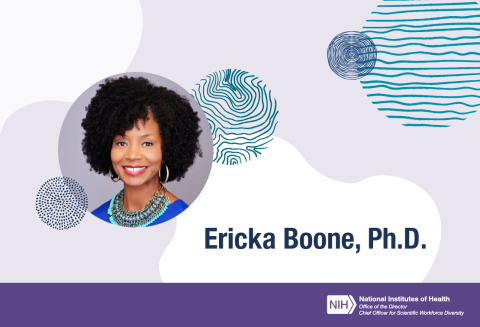
Ericka Boone, Ph.D., Director of the NIH Office of Extramural Research (OER) Division of Biomedical Research Workforce. Credit: NIH
In June, Ericka Boone, Ph.D., was appointed Director of the NIH Office of Extramural Research (OER) Division of Biomedical Research Workforce. Throughout a career devoted to equity in science, Dr. Boone has distinguished herself as an advocate of biomedical and behavioral workforce diversity and a steadfast supporter of early-stage investigators. Dr. Boone will deeply enhance the welfare of the NIH-funded extramural research workforce and play a crucial role in determining the direction of research training for the biomedical workforce in the future.
As an important COSWD collaborator, DBRW produces much of the data that drive our initiatives, provides ongoing analyses of the biomedical and behavioral research workforce, and evaluates NIH policies to enable the agency to sustain and grow the workforce at all levels. As DBRW director, Dr. Boone will serve as a key partner in advancing biomedical workforce diversity.
“Engaging with COSWD provides an excellent opportunity for DBRW to act as catalytic partners as we work to address one of NIH’s most important priorities, cultivating a robust and diverse biomedical research workforce that will ensure the nation’s capability to improve health,” said Dr. Boone. “We are excited to participate as partners with COSWD in contributing to the building of the vision and strategy related to research training and career development opportunities supporting current and future generations of researchers.”
Dr. Boone joined the NIH in 2008 as a Health Scientist Administrator in the Office of Science Policy and Communications at the National Institute on Drug Abuse (NIDA). She then served as Director of the NIH Division of Loan Repayment and, most recently, as Acting Director of DBRW.
As DBRW Director, Dr. Boone leads the development, implementation, and evaluation of policies and programs to train, sustain, and enhance the health research workforce. She is also involved in UNITE, co-chairing the E Committee, charged with promoting workforce diversity in the NIH extramural research ecosystem through initiatives such as the diversity, equity, inclusion, and accessibility (DEIA) prize competition, the DEIA mentoring award, and others that overlap the COSWD mission.
“We say that diversification of the biomedical research workforce—in various forms—is important to us. We have to make sure we are actualizing that,” said Dr. Boone.
I encourage you to follow Dr. Boone, who is active on Twitter, sharing information related to recruiting and retaining an inclusive scientific workforce.
I’m proud to work with Dr. Boone. Her work ethic, experience, and passion for enhancing workforce diversity will serve as an outstanding example for early career researchers as she continues to forge an equitable path in science and a stronger future for research training.

